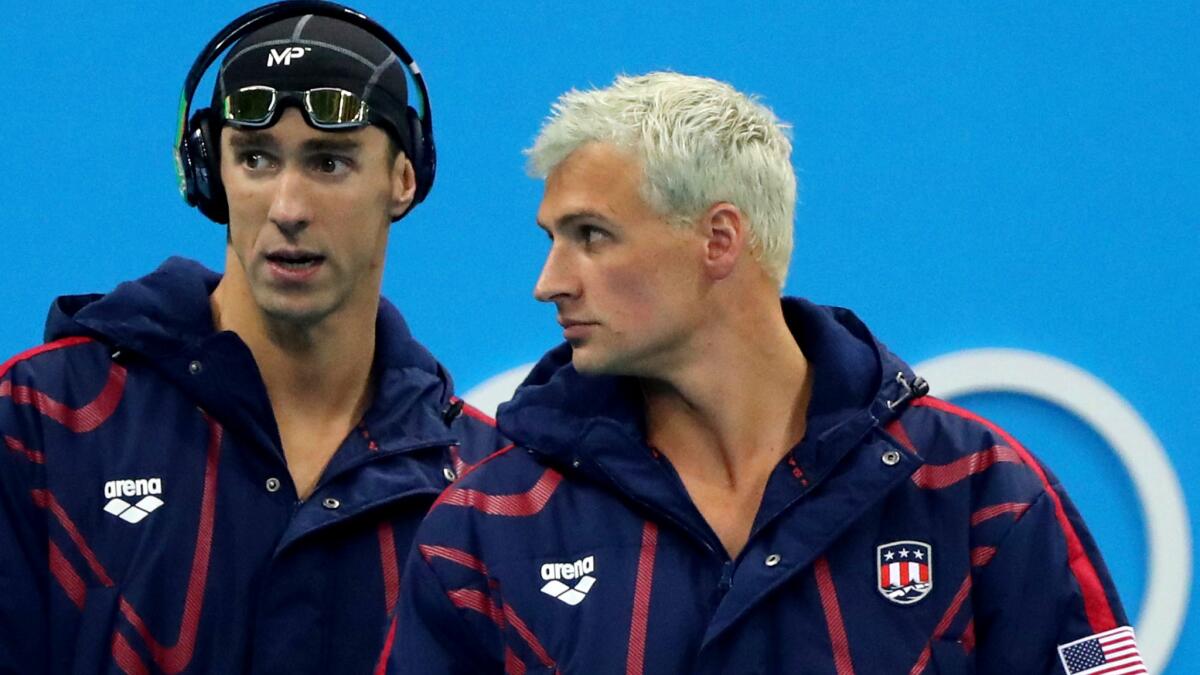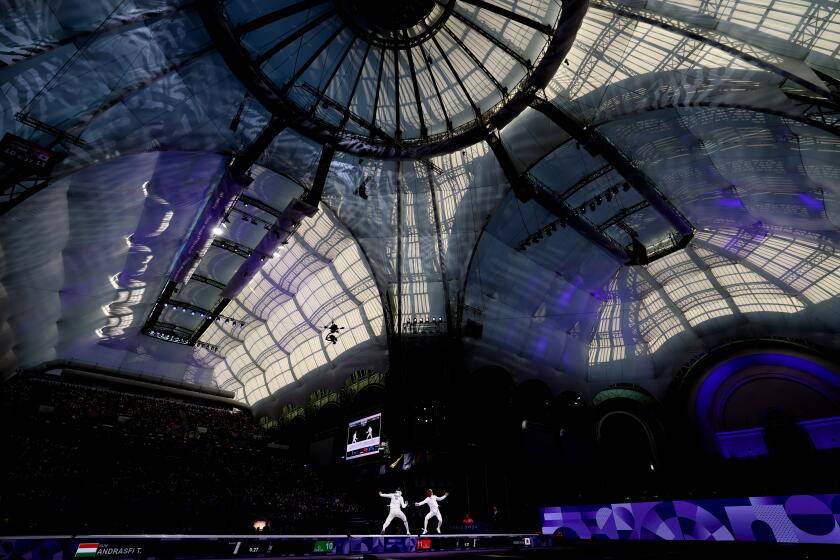Ryan Lochte recalls a gun to his head after another troubled day at Rio Olympics

A few hours after the eight-day Olympic swimming competition ended on Saturday, Ryan Lochte and three of his U.S. teammates ventured out to enjoy the city’s lively nightlife.
The 12-time Olympic medalist, joined by Gunnar Bentz, Jack Conger and Jimmy Feigen, dropped by France’s sprawling hospitality venue at the Brazilian Equestrian Society.
A few hours later, Lochte said the foursome grabbed a taxi to head back to the Olympic village and within minutes their night out turned dangerous as they were stopped and robbed by men flashing police badges.
“They pulled out their guns, they told the other swimmers to get down on the ground — they got down on the ground,” Lochte told NBC News. “I refused, I was like, we didn’t do anything wrong, so — I’m not getting down on the ground.
“And then the guy pulled out his gun, he cocked it, put it to my forehead and he said, ‘Get down’ and I put my hands up, I was like ‘whatever.’”
While some details about the run-in remain unclear, the incident has highlighted what many people see as one of the most troubled Olympics in recent times. The Games have been replete with logistical issues, empty seats and embarrassing problems at venues, in addition to the serious ongoing security issues.
David Wallechinsky, historian and author of “The Complete Book of the Olympics,” linked these Games to two of the most dismal Olympics in recent memory.
“I compare it to the worst of Athens and the worst of Atlanta, with a crime problem thrown in,” he said. “I think the organization leaves a lot to be desired, to say the least.”
When the International Olympic Committee selected Rio de Janeiro as the host seven years ago, the country’s economy was booming and Brazil was held up as a model for emerging nations. Still, Olympic leaders gambled in leaving the familiar circuit of host cities in Europe, North America and Asia.
The risk loomed larger as Brazil’s economy plunged into deep recession and the political situation deteriorated with President Dilma Rousseff suspended and facing impeachment. Rio 2016 organizers announced late last year that they needed to cut $500 million from the operating budget.
With the world watching, the country’s reputation is at stake.
“What are they going to be recognized for by the time these Games are done?” asked Lowell Gustafson, a humanities and social sciences professor at Villanova University. “That’s what everybody is so nervous about.”
Before the Games opened, Rio de Janeiro Mayor Eduardo Paes pledged that his city would be the “safest place in the world.” More than 80,000 security personnel brought in for the event have been a visible presence around Olympic venues with soldiers toting assault rifles and patrolling in armored vehicles.
The gunpoint robbery of the U.S. swimmers is merely the latest incident raising questions about security.
Two Australian rowing coaches were robbed in Ipanema and an Olympic security officer was shot to death after taking a wrong turn into a favela. The chief of security of the Games was attacked by knife-wielding men as he left Maracana Stadium after the opening ceremony. Numerous photographers covering the Games have had gear stolen.
Stray bullets landed in the equestrian venue in Deodoro on two occasions and a bus carrying journalists in the area had its windows shattered. Rio officials insisted that thrown rocks were to blame.
Authorities have found unattended bags near several venues and summoned bomb squads to set off controlled explosions.
“It’s unnerving,” Wallechinsky said. “They had seven years and they didn’t get things done.”
At each step, organizers have insisted that they can keep these Games safe.
After one of their own employees was caught stealing money from a room at the athletes’ village, Rio 2016 spokesman Mario Andrada said: “Security has been upgraded in the village on several instances … but we are working to educate athletes and staff to be vigilant.”
There has also been a succession of smaller, yet unprecedented, problems, the most visible of which was the diving pool at the Maria Lenk Aquatics Center that turned bright green from algae.
Friday night’s swimming schedule had to be shifted at the last moment when a bus carrying three swimmers, one of whom eventually won a bronze medal, mistakenly drove the opposite direction toward the track stadium, part of a system struggling to transport athletes, staff and media between venues.
When a huge platform to be used for the start of open-water swimming broke loose from its mooring and washed ashore, Andrada called it “acts of God and nature.”
“This has been the most difficult Games we have encountered,” IOC vice president John Coates said, referring to Brazil’s economic and political turmoil.
Not that these missteps have been noticeable for the vast majority of fans watching on television.
“Track, swimming, gymnastics – there have been some really great competitions,” Wallechinsky said. “If you’re following the Olympics on TV from home, everything’s fine. But if you’re here, it’s another story.”
Sunday began with reports that Lochte texted his mother, Ileana, with news of the robbery. Not long afterward, the swimmer told the U.S. Olympic Committee that the story wasn’t accurate. At the daily press briefing, IOC spokesman Mark Adams, having just gotten off the phone with the USOC, said the report was “absolutely not true.”
As the confusion ebbed, the IOC then referred all comment to the USOC, saying it was simply conveying the information provided by the other organization.
Lochte later issued a statement that said “what is most important is that we are safe and unharmed.”
Lochte and Feigen roomed with Michael Phelps in the athletes’ village. News of the robbery caught the most decorated Olympic athlete of all time off guard less than 24 hours after the final race of his career.
“I couldn’t believe it,” Phelps said. “For me, I’ve been to Brazil multiple times and I felt safe every time I’ve come here. I’ve never felt an issue.”
In a question-and-answer session on Reddit last week, Feigen sounded excited about the entertainment possibilities in Rio de Janeiro after the swimming competition ended.
“Once the Games are over the party begins!” he wrote. “That is outside the village though.”
Times correspondent Vincent Bevins contributed to this story.
ALSO
Sunday’s Rio Olympics schedule and results
Green pool water? A couch tossed in the kayaking venue? ‘No regrets,’ says IOC spokesman
It’s not easy being green: Rio officials to drain discolored pool water and start over
More to Read
Go beyond the scoreboard
Get the latest on L.A.'s teams in the daily Sports Report newsletter.
You may occasionally receive promotional content from the Los Angeles Times.










